Doodle & Drink (Dickinson & Silverstein)
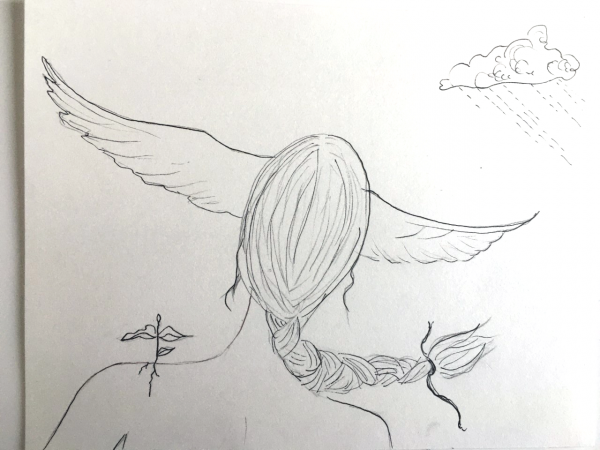
Jeanne Knott (Visual Arts Class Assistant)

Enjoy a glass of wine, a cup of tea or a glass of milk while you join us in a fun doodling exercise using the following quote and poem to inspire a drawing!
For all ages—adults and children—for anyone!
—Emily Dickinson
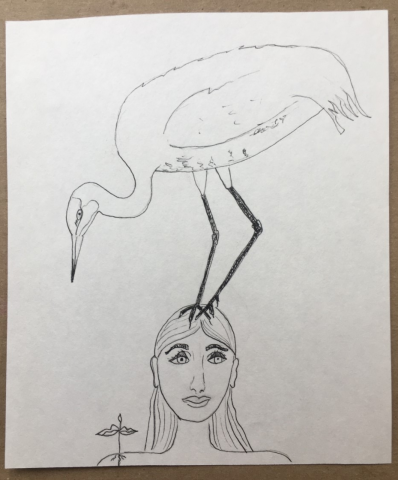
—Shel Silverstein
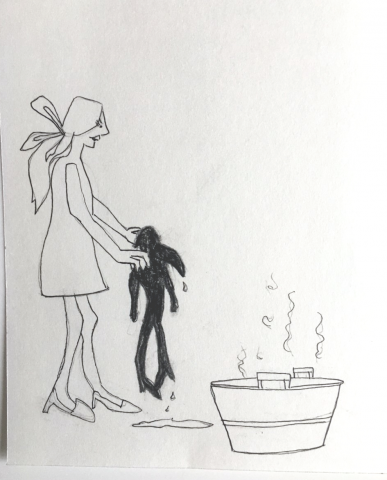
DIRECTOR'S NOTES: The Simple Fact Is, Facts Aren’t Simple
March 5, 2020
Scott Palmer (Producing Artistic Director, Company of Fools)
The simple fact of that matter is this: facts are not simple, and yet they matter.
I have always believed that one of the most important functions of theatre is to ask questions – big, big questions. Yes, theatre should entertain, delight, thrill, and engage, but more than that theatre should ask us questions about our world and how we want to live in it. The Niceties does that, and so much more.
The Niceties is both a small, intimate play about the relationship between two powerful, unique women and, at the same time, it is a sweeping play that questions the scope of history and some of our most important institutions. For me, this is what makes great theatre – the small thing that asks us questions about the huge.
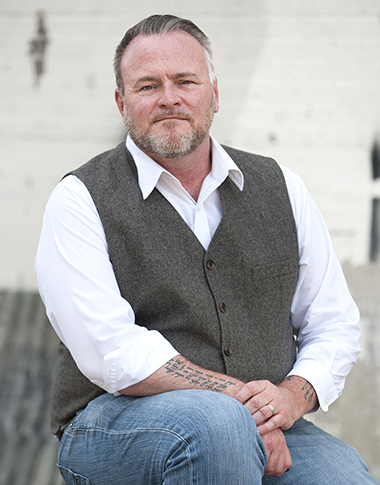
We are in a profound moment of upheaval in our country, a time when Americans of all backgrounds, faiths, heritages, and political perspectives are being challenged to rethink our most beloved principals. Conversations on television, social media, and around our dinner tables are becoming more heated and more divided as we grapple with what appear to be mutually-exclusive ideals. Talking to each other has become an act of bravery; we worry that what we say won’t be heard, what we hear isn’t what was meant, and how we speak can be turned against us.
What Eleanor Burgess has done with The Niceties is to put all of those stresses and strains into a powder-keg shaped play bristling with conflict and alive with the potential for disaster; a shape that should be familiar to us as we look across our media landscapes, into our communities, and sometimes into our own families.
When I first read The Niceties I can remember thinking to myself, “Why don’t they just shut up and listen to each other!?!” Perhaps that is the real “big question” posed by this remarkable (and remarkably difficult) play: why can’t we just listen to each other? Even if what we hear is hard to take, it is the only first step that might help us get through these challenges times, and help us get through to each other.
I look forward to listening to your thoughts on The Niceties, even though I know it will be hard.
Continuing To Learn Everyday
February 21, 2020
Claudia McCain (Actor)
The Niceties is one of the most challenging plays I have worked on. It’s the kind of play that actors long for. For me it is on par with Wit (where I played a woman who had stage 4 ovarian cancer and was a professor of John Dunn). The Niceties is a dense, layered play in content, language, emotion, energy and scope. So often plays present me with great opportunities to learn and expand. Wit had a profound effect on my life. The Niceties clearly is having the same effect. From my first reading of the play, I have not stopped thinking about it. I continue to learn from it every day.
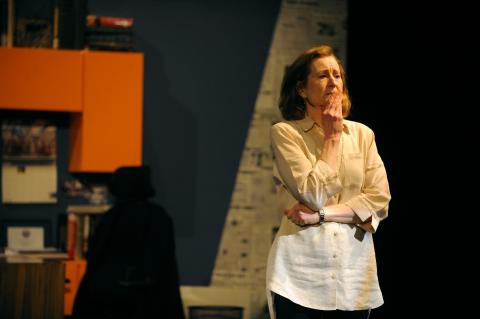
I began my research in September, certainly it was not all at once. The holidays interrupted my study, but I’ve spent long hours at my computer, often into the wee hours (with apologies to my character, Janine, who says you need to be in the library for research!). COF founder Rusty Wilson drilled into us that you must be familiar with all of your circumstances in a play, including the time period, the people with whom you associate, everything you say and who you are in that context. Not being a student of history, I had a lot to learn. Even if I was familiar with an individual or a historical account, I still felt the need to study it. Believe me, there are numerous individuals and events mentioned in the play that I had to explore. I also studied about the racial divide between African American and White cultures. Just because of time I could not investigate as deeply as I would have liked into everything presented but I have learned a great deal. My research has been fascinating, enlightening and quite disturbing. I have read a bit about revolutions, talked with friends who are historians, writers (thank you Don and Marcia Liebich), educators and mentors. I have been consumed with this show!
Overall, I realize how much I have learned and how much more I still need to learn. In every aspect of my life, I must become a better listener. It is something I have already been working on, but this show pinpoints that need. As Zoe tells Janine “you need to shut up and listen.” And I do! Just to absorb and understand. The only way I can get through this play is to listen. The only way I can have empathy is to listen. It is something “I keep, keep, keep, keep, striving toward.”
Community
December 10, 2019
()
By Orion Bradshaw (Actor / Educator)
What does the word community mean to You, individually? Ask yourself…
Now think about it just a bit longer…
And now: “You’re welcome.” It’s high time to reclaim these two words within our vernacular, to transform them from cliché to genuine invitation.

Let us not forget that “Ally” is also a Verb. A verb which implies taking distinctive action, of quite often stepping out of one’s comfort zone — even at the risk of discomfort, criticism, or even judgement. For example, perhaps any number of audience members from our sensory-friendly invited dress, student matinees, and parent/ baby matinee performances must get up and move around, or vocalize prominently during or throughout the show. Regarding that, please allow me to use an “I” statement here: in those moments, my implicit bias of what behavior is or is not “acceptable” within the conventions of the modern Theater may come bubbling rapidly to the surface. “Why are they getting up and walking out of the theater at this pivotal moment?! Who brings a baby to the Theater?! Who is making all that noise out there?!” These are impulses that I have been socially conditioned to feel, and I have felt them all during my 17 or so years on the stage. It is part of my personal journey to steadily UNlearn these sentiments… because the ecology of our patron population is shifting, as it should. We as Theatre-makers must stay ahead of this shift, that we might provide an invaluable service to the members of our community who’ve been traditionally pushed to the fringes of our collective awareness. The old guard can no longer support this art form with any sort of longevity; it’s high time to Welcome new patrons of Theatre into our house, and inspire them to stay a while — perhaps for a lifetime.
I am truly inspired by the community-minded initiatives that Company of Fools is bringing to this community, and hopefully beyond. And I’m immensely grateful that I get to unlearn archaic points of view regarding the craft I love so dearly. I sincerely hope that you will come in from out of the cold this month and get warm with us in Regency-era England… and then join us again early next year for something completely different: The Niceties, by Eleanor Burgess. A play for a new era of critical human dialogue; a newer story for a newer world.
Art has a responsibility to its Community. The weakest type of Art is the self-serving kind, if you ask this blogger. To serve one’s community, to call one and all into critical dialogue, to educate a whole generation of people through one’s assets — that is how to genuinely leave a legacy. Onward and forward…
Which reminds me: you are WELCOME to engage me in further dialogue regarding any of these blog posts, and the topic(s) they muse on, after any performance of Miss Bennet: Christmas at Pemberley that you may be present for and/or after. I’d love to meet you, and digest these things further with you.
May the Learning never cease!
Dear Educator,
Company of Fools is pleased to offer you this study guide to prepare you and your students for our performance of MISS BENNET: CHRISTMAS AT PEMBERLEY, by Lauren Gunderson and Margot Melcon. Working with schools is a fundamental part of Company of Fools’ and the Sun Valley Center for the Arts’ mission.
We hope this study guide will serve as a useful resource for you as educators and parents. It is designed to enhance student learning both before and after the performance, to support your classroom lesson plans and deepen the educational value of your students’ experience. The resources and activities in this study guide support the Idaho Content Standards in English Language Arts and Literacy for grades 8–12.
Thank you for the sharing the magic of performing arts with your students!
—Company of Fools
Miss Bennet: Christmas at Pemberley
Cry It Out and Civic Practice
October 7, 2019
Scott Palmer (Producing Artistic Director, Company of Fools)
Molly Smith Metzler, the playwright of Cry It Out, describes the inspiration for her play in this way:
“When I was six months pregnant, my husband and I relocated from NYC to a small Long Island suburb called Port Washington. He was starting a new teaching job nearby, and we thought Port seemed like a quaint little beach town in which to start our family. What we didn’t consider was how isolated I would be, home with a newborn. We knew absolutely no one in town, and we couldn’t afford a second car, so I was trapped at home all day during the longest, snowiest, coldest winter in the history of Long Island. It was basically Winterfell, and I was dying of loneliness. But then one day, I met another mom. She lived within walking distance, and she had a baby the same age as mine, and even though we had very little in common, she saved my life and introduced me to this beautiful community of moms in town, who all shared their stories with me. I was surprised to realize that no matter what economic background we came from, we all had the same struggles. The experience of having a baby really cracks your career open, your marriage open, your identity open… and it’s mom friends who support you and get you through it all. I thought their stories belonged on stage.”
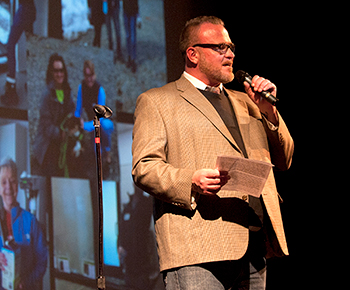 The idea that all people deserve their stories to be told on stage in an important one to me, and to Company of Fools. In the case of Cry It Out, Metzler is taking a personal experience, a deeply personal experience, and using that to create a play where audiences can learn more about the broader issues of new motherhood based on the individual experiences of the playwright and the characters on stage.
The idea that all people deserve their stories to be told on stage in an important one to me, and to Company of Fools. In the case of Cry It Out, Metzler is taking a personal experience, a deeply personal experience, and using that to create a play where audiences can learn more about the broader issues of new motherhood based on the individual experiences of the playwright and the characters on stage.
I love theatre that asks you to come in, invites you into the deeply personal and private lives of its characters, which, in turn, ask you to consider how those character’s lives can inform us about the larger context.
When you see the show, you are going to see a deeply personal story on stage; the lives of three women and their remarkably different experiences of new parenthood. But, each of these women have something to tell us, things to ask us, about new parenthood in our culture. More than that, these women challenge us to think differently about what we think we know about parenthood.
As you watch the show, I’d like to ask you to do me a favor: ask yourself if what you are seeing tonight supports or challenges your assumptions about new parenthood? Ask yourself if what you are watching supports your assumptions and what you see that might challenge your understanding, beliefs, and assumptions.
New parenthood is ubiquitous. I said to someone the other day who asked me who this show was for, I said “It is for anyone who has had a baby, anyone who knows someone who has a baby, or anyone who was ever a baby…so, it is for everyone,” and I also think that applies to the broader social and political implications of parenthood.
Here is what recent research tells us about new parenthood in the United States.
In more than 70% of American households with new babies, both parents work. We know that child care costs, on average, $14,000 a year but in many major cities, it can cost more than twice that amount. We know that paid leave for parents is available to about 17% of US workers, and that unpaid leave is available to only about 59% of workers… but we also know that most moms can’t afford to take advantage of unpaid leave due to financial constraints on their families. 50% of women in the United State take less than 2 months of maternity leave, and 1 in 4 new moms in this country return to work within 2 weeks of giving birth.
And these are just a few of the pressures facing new parents, of all genders, that have profound personal and economic impacts on them and their families.
It was surprising to me to discover that American moms are feeling more depressed, less competent, and less positive about their co-parenting relationships than at any other time in our history.
1 in 3 new mothers say that they experience a sense of deep loneliness and feelings of profound isolation after giving birth to their first child, and researches say that cultural expectations make it difficult for new moms to admit to anything but positive emotions about motherhood, so the scale of the problem may, in fact, be much larger.
Throughout the show, each of the moms provides a deeply personal view on the implications of these realities. When should I go back to work? What happens to my child if I have to go back to work? What happens to my life if I don’t go back to work? How can I afford child care without returning to work? What do these choices mean for my partner or co-parent? What are the implications of these choices on my family, my spouse, my extended family, and my community? How do these pressures ripple out and impact all of us – those of us with children, those of us considering having children, and those of us who do not, and won’t ever, have children?
It was my great pleasure to be here, at The Liberty Theatre, on September 23rd, with about 50 members of our community for Company of Fools’ first ever Parent & Baby night. Parents and friends of about a dozen or so teeny tiny little babies joined us here for the performance and for an opportunity to connect with each other as new parents. Given the challenges of social isolation, it felt important to us to respect the origins of this remarkable story by ensuring that parents here in the Valley have the opportunity to come together, to forge connections with other new parents, during a performance where the other audience members would have complete sympathy for babies who might be fussy or have a meltdown.
We made sure that the theatre was ready for parents and babies, including having the houselights up so parents could keep an eye on their kids, find the diaper bag, or get access to a toy or snack. We had baby changing stations, cribs, toys in the lobby, and both parents and little ones wandered the aisles, rocking, playing, and otherwise just being babies and parents watching a show.
Our partnership with St. Luke’s Wood River also allowed us to offer these parents a chance to learn about resources available to them in the Valley; new mom groups, access to post-natal care, and general information about the trials and tribulations of new parenthood.
We are also delighted to have partnered with other non-profit organizations in the Valley, many of whom are with us tonight, including our friends at Camp Rainbow Gold, an amazing non-profit dedicated to emotionally empowering experiences to children diagnosed with cancer and their families, the Papoose Club, a non-profit volunteer organization that supports youth-oriented groups throughout the Valley, and Crisis Hotline in honor of Suicide Prevention month.
These partnerships, and our focus on important stories about social justice and inclusion, is part of a theatre movement across the country called Theatre Civic Practice – a term coined by our friends at HowlRound Theatre based out of Emerson College in Boston.
Currently, within institutional theater organizations, community partnerships are fairly common and are most frequently developed by the theatre to help implement programming that surrounds mainstage productions. For example, our Parent & Baby night is a great vehicle for giving new parents a chance to attend theatre and make connections, but, to be honest, it is also a great vehicle for the Fools to get some great press coverage and support our marketing for the show. Our partnership with St. Luke’s is equally valuable, it will help us both build new relationships around meaningful, shared interests, and it has already helped us broaden our reach in our community. But more than that, Civic Practice asks the Fools to be focused on how to create intersections – The Liberty will be a place where conversations are sparked, where questions are asked, and where connections between the work on stage, the people on stage, the people in the audience, and the people NOT in the audience, are primary.
Civic Practice is defined as an activity where a theater employs the assets of their craft in response to the needs of a community as determined through ongoing, relationship-based dialogue. What it means is that the theatre understands that it operates within a community, and that the health of that community has a direct and powerful relationship to the health of the theatre. It asks us, as an institution, to remember that we have unique skills and resources that can, and should, be used for the benefit of all.
As you watch the show, it is my hope that you will keep Civic Practice in mind. In what ways does this show speak to your experience, and in what ways does it NOT? How can you take what you see tonight and apply it outside of the theatre? Perhaps more importantly, what can we as a theatre company do for you? What skills and resources do we have that could be of help to you and to our community? What kinds of shows can we produce that will advance our Civic Practice? What role can you play in helping support our Civic Practice? What does it mean for us all to embrace a mentality of Civic Practice?
Every show this season has, and will continue to be, an attempt at Civic Practice. It doesn’t mean that we forget our role as a producer of theatre- in fact, Civic Practice calls us to use our skills as theatre artists. We still strive to entertain, to produce the highest quality work within our means, but will hope to do so in a way that is in service to the community.
In the coming months, you will see us announce new initiatives, such as autism and spectrum disorder appropriate performances, a continuation of our Parent & Baby performances, workshops and education opportunities connected to the themes of our shows – but you will also see our actors from Miss Bennett: Christmas At Pemberly reading Jane Austen to children at the library, you will see our staff dedicating Fools Day as a day of giving back through volunteerism at a local non-profit, you will see us actively promoting the work of other non-profit arts organizations…
But what I also hope you see is that our doors are open and we are here to listen. I also hope that you see that we are eager to bring our skills to the table, if they are helpful, to assist in whatever way we can. I hope you will see that we are eager to be more than just a place to see great shows, we want to be a place of connection, discussion, and support for the needs of our community.
Let me know how we can help. It’s our job.
Registration for SVMoA programs will vary depending on the event from FREE to a range of ticketed prices. SVMoA members receive discounts on most ticketed programs and events.
Admission to the museum is always FREE!